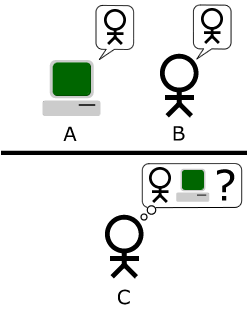 Every time we go to leave a comment on one of our media blogs, we encounter a CAPTCHA, the little reading test that is designed to prevent, or at least reduce, comment spam. In case you were wondering, it stands for Completely Automated Public Turing Test To Tell Computers and Humans Apart. Turing here refers to Alan Turing, one of the founding fathers of computers. His test? He thought that computers would never have true "intelligence" but that if they could fool a human in conversation, that'd be close enough.
Every time we go to leave a comment on one of our media blogs, we encounter a CAPTCHA, the little reading test that is designed to prevent, or at least reduce, comment spam. In case you were wondering, it stands for Completely Automated Public Turing Test To Tell Computers and Humans Apart. Turing here refers to Alan Turing, one of the founding fathers of computers. His test? He thought that computers would never have true "intelligence" but that if they could fool a human in conversation, that'd be close enough. |
| If a person remotely asked a question and couldn't tell if the response was from either a computer or a person, the computerized response would pass the Turning Test. |
With the millions of CATCHAs being processed each day, somebody noticed that all this effort really wasn't being fully harnessed. In response, reCAPTCHA was developed. This new upgrade took all that problem-solving energy and applied it to a problem: digitizing books. And so now millions of people a day at Facebook and countless other sites are asked to type the words that come from a scanned book and are helping to get books digitized and freely available online, like at Archive.org.

This small shift in thinking in harnessing that energy in turn cause a small revolution in the world of CAPTCHAs. Now, not only are books being digitized but CAPTCHAs are being modified to serve all sorts of needs. Users are no longer just encountering text, as programmers have shifted to image recognition. And so Petfinder.org, for example, uses the dog/cat Turing Test for its CAPTCHAs.
And just look at all the uses for the new generation of CAPTCHAs, some useful, some goofy, some cute and some just downright bizarre, in this unexpectedly developing new medium:
This one's from the website HotOrNot.com:
Fail:
Lastly, I just wanted to leave you with yet another iteration of this emerging media: the cartoon...












I never knew that reCAPTCHA was used to digitize books. It's funny that you're not even told about this when using the service. It's ingenious in my mind. You're essentially tackling two issues at once - one is security/spam related and the other is related to digitizing poorly scanned books.
ReplyDeleteIn this case, we see how media can have multiple uses and cannot be interpreted singularly. This is quite important and essential to understand.
This is a unique idea. CAPTCHA also plays upon stereotypes based upon sites you have viewed in the past. They assume you are still interested.. Although annoying at times.. I do find them helpful. I think spam in some way is used to create awareness and try and target the individuals who they would not regularly be able to gain their attention.
ReplyDeleteBrittany, how does the CAPTCHA play upon stereotypes based on sites we've viewed? This is new to me and I'm not sure how that could happen insofar as there's no cookie system involved in the protocol that I'm aware of. Now that you've got me curious, I'm going to go check it out. Thanks!
ReplyDelete